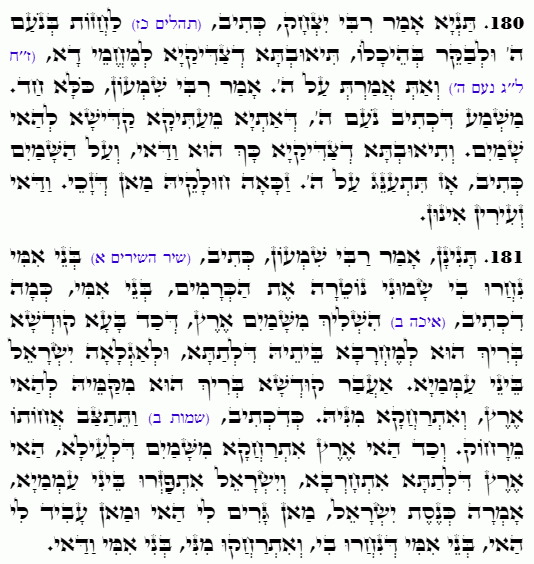Daily Zohar # 4752 – Vayechi – To behold the pleasantness of Hashem
Daily Zohar 4752

Hebrew translation:
181. שָׁנִינוּ, אָמַר רַבִּי שִׁמְעוֹן, כָּתוּב (שיר א) בְּנֵי אִמִּי נִחֲרוּ בִי שָׂמֻנִי נֹטֵרָה אֶת הַכְּרָמִים. בְּנֵי אִמִּי, כְּמוֹ שֶׁכָּתוּב (איכה ב) הִשְׁלִיךְ מִשָּׁמַיִם אֶרֶץ. שֶׁכְּשֶׁרָצָה הַקָּדוֹשׁ בָּרוּךְ הוּא לְהַחֲרִיב בֵּיתוֹ שֶׁלְּמַטָּה וּלְהַגְלוֹת אֶת יִשְׂרָאֵל לְבֵין הָעַמִּים, הֶעֱבִיר הַקָּדוֹשׁ בָּרוּךְ הוּא מִלְּפָנָיו אֶת הָאָרֶץ הַזּוֹ, וְהִתְרַחֲקָה מִמֶּנּוּ, כַּכָּתוּב (שמות ב) וַתֵּתַצַּב אֲחֹתוֹ מֵרָחֹק. וּכְשֶׁאֶרֶץ זוֹ הִתְרַחֲקָה מִשָּׁמַיִם שֶׁלְּמַעְלָה, הָאָרֶץ הַזּוֹ שֶׁלְּמַטָּה נֶחְרְבָה, וְיִשְׂרָאֵל הִתְפַּזְּרוּ בֵּין הָעַמִּים. אָמְרָה כְּנֶסֶת יִשְׂרָאֵל: מִי גָרַם לִי אֶת זֶה וּמִי עָשָׂה לִי אֶת זֶה? בְּנֵי אִמִּי שֶׁנִּחֲרוּ בִי וְהִתְרַחֲקוּ מִמֶּנִּי, בְּנֵי אִמִּי וַדַּאי.
.
Zohar Vayechi
Continued from previous DZ
#180
We have learned Rabbi Yitzchak said: It is written, “לַחֲזוֹת בְּנֹעַם ה’ וּלְבַקֵּר בְּהֵיכָלוֹ” “To behold the pleasantness of Hashem and to visit His Temple” (Psalms 27:4). This implies that the Tzadik yearns to see the ‘pleasantness of Hashem’, which refers to the delightful Mochin (מוחין הנעימים) of Zeir Anpin. But how can you say that it pertains to “Hashem”?
Explanation: The difficulty is that the verse seems to suggest that a Tzadik yearns to behold the ‘pleasantness’ of YHVH, Zeir Anpin, and not beyond it. However, another verse states, “אָז תִּתְעַנֵּג עַל ה’ וְהַרְכַּבְתִּיךָ עַל בָּמוֹתֵי אָרֶץ” “Then you will delight in Hashem, and I will cause you to ride upon the heights of the earth” (Isaiah 58:14), implying a level higher than Zeir Anpin.
Rabbi Shimon said: It is all one. The verse, “the pleasantness of Hashem,” refers to the illuminations that come from Atika Kadisha to the heavens, meaning the Mochin that Zeir Anpin receives from levels higher than itself. Thus, the yearning of the Tzadikim is indeed only to grasp these illuminations within Zeir Anpin and not to ascend beyond it, as there is no perception in the upper three sefirot.
This is why it is written, “ועל השמים חסדך” “Your loving-kindness (Chessed) is in the heavens,” referring to those illuminations that originate above Zeir Anpin. And it is written, “אָז תִּתְעַנַּג עַל ה'” “Then you will delight in Hashem,” meaning they are already clothed within Zeir Anpin, which is why they are referred to as “the pleasantness of Hashem.” However, before this pleasantness is clothed in Zeir Anpin, it is entirely beyond comprehension.
Fortunate is the one who attains this, as certainly, very few achieve it.
#181
We have learned, Rabbi Shimon said: It is written, “בְּנֵי אִמִּי נִחֲרוּ בִי”
“My mother’s sons were angry with me” (Songs 1:6). “Bnei Imi” (My mother’s sons) refers to what is written: “הִשְׁלִיךְ מִשָּׁמַיִם אֶרֶץ” “He cast down from heaven to earth” (Lamentations 2:1).
Here, “earth” refers to the Nukva. For when the Holy One, Blessed be He, desired to destroy His lower house, meaning the Holy Temple, and to exile Israel among the nations, He distanced this earth, which is the Nukva, from before Him. As it is written: “וַתֵּתַצַּב אֲחֹתוֹ מֵרָחֹק”
“And his sister stood at a distance” (Exodus 2:4).
When this earth (Malchut) was distanced from the heavens above (Zeir Anpin), the earthly Temple below was destroyed, and Israel was scattered among the nations.
The Congregation of Israel said: Who caused this to happen to me? Who did this to me? It was “בְּנֵי אִמִּי” “Bnei Imi”—the sons of my mother—namely, Zeir Anpin and its Nukva, who distanced themselves from me. Indeed, they are called “Bnei Imi,” for Zeir Anpin, and its Nukva are children of Binah, who is the mother.
Notes:
The distancing of Malchut from Zeir Anpin signifies the removal of unity and protection of Hashem, leading to the destruction of the earthly Temple and the dispersion of Israel. The Congregation of Israel, representing the collective spiritual entity of the Jewish people, laments this separation as the root cause of exile and suffering.
{||}

 Previous: Vayechi
Previous: Vayechi

